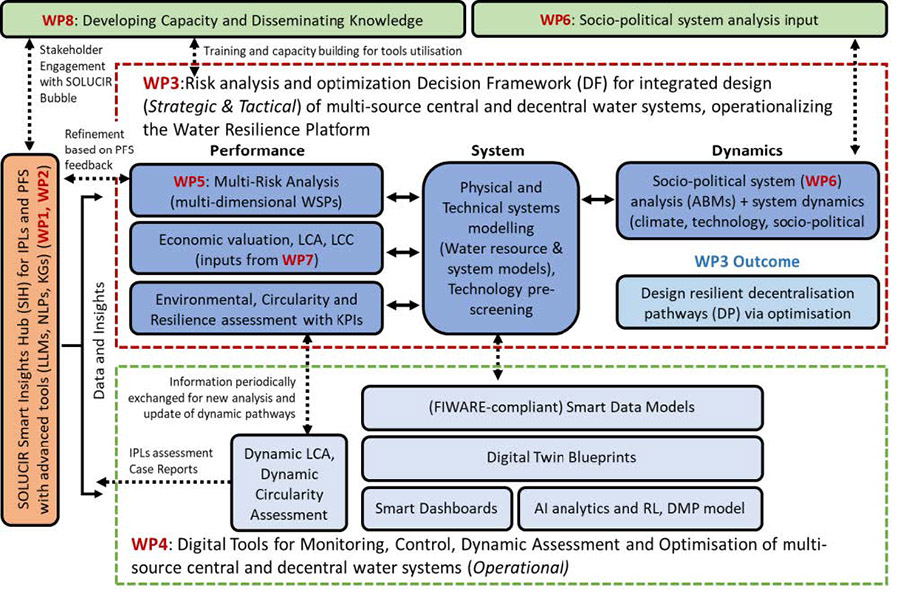DURATION: 01.01.2026 to 31.12.2029
BUDGET: 945,500.00 € / 4,994,729.13 €
FUNDING: HORIZON-CL6-2024-CIRCBIO-02
ABOUT SOLUCIR
SOLUCIR - Solutions for Circular Water and decentralisation is a 4year HORIZON strategic project addressing the growing need for widespread adoption and deployment of circular and decentralized water management solutions. The project aims to overcome key technical, financial, regulatory, and societal challenges that currently hinder the widespread adoption of these solutions. SOLUCIR treats decentralised solutions not only as effective alternatives but also as resilient upgrades to existing centralized water systems.
The project leverages insights and lessons learned from 23 Inspirational Pilots (IPLs), which are existing pilots demonstrating novel technologies on the ground. This knowledge is then applied to develop 5 Pathfinding Studies (PFSs) in EU regions, along with one additional Transferability Study in a Developing World context (South Africa), through collaboration with utilities and local stakeholders. This process is supported by innovative tools and digital solutions for integrating hybrid systems and enhancing operational efficiency.
To realize its ambitions, SOLUCIR unites a strategic alliance of top universities, advanced research institutions, forward-looking water utilities, and key experts in socioeconomics, business, and innovation, blending cutting-edge knowledge with practical experience to generate tangible impacts.
THE CHALLENGE
Water management is increasingly strained due to climate change, expanding urban populations (especially in peri-urban areas) and inadequate infrastructure. Particularly:
- Infrastructure Gaps: Existing centralized systems are often inflexible, slow to build, and struggle to keep pace, particularly in peri-urban and rural areas.
- Regulatory & Financial Barriers: The current legislative environment often does not fully support closed water loop solutions, and there is a lack of long-term performance-based business models and investment schemes for decentralized systems.
- Knowledge & Skills Deficiencies: There are knowledge gaps and a shortage of skilled personnel and companies needed to plan, procure, operate, and maintain decentralized solutions.
- Risk and Acceptance: Barriers exist concerning perceived risks (health, operational) and public resistance to adopting new multi-source or reuse solutions.
VISION
SOLUCIR aims to catalyse the large-scale adoption of circular and decentralised water solutions, working in combination with existing centralised legacy systems and services (where available), by demonstrating the flexibility, scalability, and benefits of these approaches and by directly addressing key technical, financial, regulatory, and societal barriers and obstacles. The SOLUCIR vision extends beyond technological innovation; it seeks to address barriers for widespread adoption of decentralised solutions, fostering public engagement, and promoting sustainable practices at community level, as well as for emerging economies and underdeveloped regions within and outside Europe and as a means for faster post-disaster and post-war reconstruction (e.g., in Ukraine).
KEY OBJECTIVES
SOLUCIR is guided by seven Specific Objectives:
- Knowledge Base: Analyse 23 Inspirational Pilots (IPLs) to identify enabling factors, barriers, and transferable lessons for scale-up and replication.
- Decision Making: Develop a Decision Framework and a risk analysis/optimisation toolbox to evaluate both decentralised and centralised water system options (alone and in combination) and produce integrated design plans for multi-source water systems.
- Digital Tools: Develop tailored digital innovations (including Digital Twin Blueprints, AI analytics, and dynamic Life Cycle Assessment) to support remote monitoring and provide a common operational picture for integrated management of multi-source water systems.
- Collaboration: Propose and demonstrate the SOLUCIR Bubble, a collaborative innovation model, to support co-design, co-creation, and enhance public engagement for large-scale adoption.

- Business Models: Promote long-term performance-based business models and explore co-funding schemes (e.g., PPPs) for the deployment and operation of hybrid systems.
- Demonstration: Demonstrate solutions through 5 Pathfinding Studies (PFSs), developing realistic plans for large-scale adoption of circular and decentralised solutions that 'augment' existing centralized systems.
- Policy Support: Advance the practical application of key EU policies for sustainable and circular water management, providing recommendations and addressing regulatory barriers.
OUR ROLE IN THE PROJECT
UWMH coordinates the SOLUCIR project with our role to span high-level project management, scientific oversight, and the delivery of core technological and planning tools, complemented by active participation in co-creation and dissemination activities.



